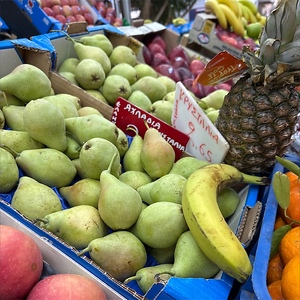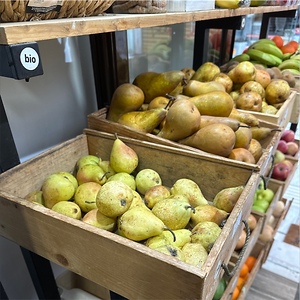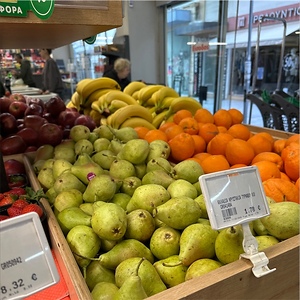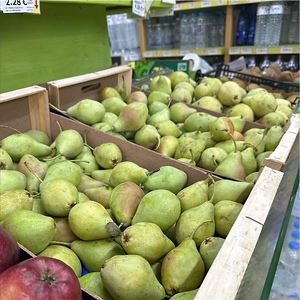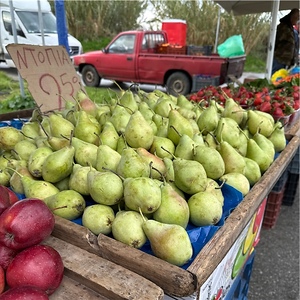


Greek Crystalia Pears
Estimated Inventory, lb : 0
Description/Taste
Crystalia pears vary in size depending on the growing region and maturity at harvest, but they are typically picked when they are around 100 to 130 grams in weight. The variety has an elongated, bell-like shape with a narrow neck, a broad center, and a blunt to tapered base. The neck is sometimes folded or creased as it has a fleshy nature. The pear’s skin is thin, taut, and smooth, ripening from green to yellow-green hues. When Crystalia pears are exposed to extended periods of sunlight, the skin may also develop patches of muted red blush. Underneath the skin, the white-to-ivory flesh is textured, aqueous, and semi-firm, with a crisp and succulent consistency. The flesh also encases a central fibrous core filled with a few tiny black-brown seeds. Crystalia pears are aromatic when ripe and release a fruity, sweet, and floral scent. The variety is edible raw or cooked and has a mild, sweet, subtly acidic, and refreshing flavor.
Seasons/Availability
Crytsalia pears are available in the summer, with a peak season from the end of July through early August.
Current Facts
Crystalia pears, botanically classified as Pyrus communis, are a sweet variety belonging to the Rosaceae family. The elongated, bell-shaped cultivar is categorized as a type of European pear and is one of Greece's most commercially grown pears. Crystalia pears are a summer variety favored for their juicy, crisp flesh, sweet and acidic taste, and versatility. The anticipated seasonal fruits are utilized in fresh and cooked culinary preparations throughout Greece, and when in season, the markets are filled with the pear’s honeyed, floral fragrance. Crystalia pears are known by several names in Greece, including Tsakoniki, Kristalia, Krystalli, and Crystallia pears. The variety is challenging to cultivate due to its susceptibility to pests and diseases, but despite these difficulties, Crystalia pears have remained a treasured variety for their productivity and flavor. Crystalia pears are a traditional pear in Greece and are sold across the country in the summer. The fruits are typically harvested before maturity and are allowed to ripen off the tree to preserve their coloring, firmer texture, and sweet flavor.
Nutritional Value
Crystalia pears are a source of fiber to regulate the digestive tract, copper to produce red blood cells, potassium to balance fluid levels within the body, and vitamin C to strengthen the immune system. Pears also provide calcium to protect bones and teeth, phosphorus to assist in repairing tissues, vitamin E to protect the cells against free radical damage, and other nutrients, including magnesium, vitamin A, and iron. In Athens, Greece, pears are valued for their antioxidant and anti-inflammatory properties. Juice from the fruits is viewed as a hydration source on hot summer days and helps to nourish and prevent sore throats.
Applications
Crystalia pears have a sweet, refreshing taste suited for fresh and cooked preparations. In Greece, Crystalia pears are one of the most popular varieties sold in commercial markets in the summer. Once ripe, the variety is commonly consumed out of hand and savored for its juicy, crisp, and succulent flesh. Crystalia pears can also be sliced and added to fruit medleys, served on cheese boards, or tossed into green salads. On warm summer days, the variety is blended into juices and smoothies as a hydration source. In addition to fresh preparations, Crystalia pears are simmered into jams, jellies, and compotes. They are also made into a fruit preserve known as spoon sweet or glyko tou koutaliou. Spoon sweet is a traditional Greek sweet typically offered to household guests with coffee or tea. The preserve is called spoon sweet as the cooked pears are enveloped in sugar syrup. This mixture is so sweet that it is only served in small amounts, often just a spoonful. Spoon sweet can also be used as a topping over yogurt, granola, and ice cream. Beyond preserves, Crystalia pears are poached in wine as a decadent dessert, preserving their curved shape, or they are stuffed and baked with sweet, crunchy fillings such as baklava. The variety can also be grilled to create a smokey flavor and enhance sweetness, baked with spices, or cooked into tarts, cakes, and other pastries. Crystalia pears pair well with honey, ricotta, halloumi, arugula, orange, chocolate, ginger, apple, nuts such as almonds, walnuts, and pistachios, vanilla extract, and cinnamon. Whole, unwashed Crystalia pears should be ripened at room temperature. Once mature, they will keep for several weeks in the refrigerator. In professional cold storage, Crystalia pears will last for 4 to 6 months.
Ethnic/Cultural Info
Pears are a symbolic fruit in Greek mythology and are deeply intertwined in the stories of Hera and Aphrodite. Hera is the goddess of marriage and childbirth and is also known as the queen of the gods through her marriage to Zeus. The curved nature of pears is associated with Hera, as the fruits are said to resemble wombs. Pears symbolize the creation and separation of two lives, mainly between mother and child, and Hera is responsible for gifting the blessing of children in Greek mythology. In ancient times, pear tree wood was used to carve idols in honor of Hera. Crystalia pears are named after crystals, a descriptor for their unique shape. Local lore in Greece also shares a tale recounting how Demeter, the goddess of agriculture, formed Crystalia pears to evoke feelings of love, beauty, and harmony. The fruit was presented at a mythological feast to honor Hera and Aphrodite, the goddess of love, to determine who was the fairest of the two goddesses.
Geography/History
Crystalia pears are descendants of varieties originally native to the Caucasus region, spanning across parts of Eastern Europe and Western Asia. These ancient varieties were transported along trade routes and were eventually planted in the Mediterranean, where new varieties were selectively bred over time. The exact origins of Crystalia pears are unknown, but they are hypothesized to have arisen from cultivation in Greece. Pears were mentioned in the writings of the Greek poet Homer, most famously in his work The Odyssey. Homer references pears as a “gift of the gods,” and the fruits later became a staple fruit grown throughout Greece. Today, Crystalia pears are one of the most commercially grown varieties and are primarily cultivated in Macedonia, northern Peloponnese, and Thessaly. The variety has also been introduced to Spain, where production has recently expanded and increased. The Crystalia pears featured in the photograph above were sourced through a local market in the city center of Athens, Greece.



